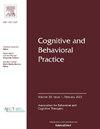Individual Video-Based Case Formulation for Participants With Persistent Physical Symptoms Associated With Indoor Environment or Chronic Fatigue
IF 2.9
3区 心理学
Q1 PSYCHOLOGY, CLINICAL
引用次数: 0
Abstract
Persistent physical symptoms (PPS) refer to a wide range of symptoms that cannot be fully explained by traditional medical assessment of bodily pathology or environmental factors. The aim of the current study was to illustrate the application of an online interview and Functional Analytic Clinical Conceptualization to describe psychological and life problems perceived by participants with PPS and to give examples of how a functional analysis approach to case formulation could assist in their treatment. We applied the Functional Analytic Clinical Case Model (FACCM) in the assessment of participants with PPS (n = 50), including three focus groups: those with PPS related to the indoor environment (n = 11), those with PPS related to prolonged fatigue (n = 28), and those with both symptoms (n = 11). Among the 50 participants with PPS, a typical amount of concurrent psychological and life problems was 9. In addition to PPS, the most typical problems reported were symptoms of stress and burnout (74%), low mood (68%), narrowing of daily life (58%), and worrying (52%). The results highlight the complexity of the participants’ life situations. We found that the FACCM was acceptable and useful in identifying potential individual treatment targets.
为患有与室内环境或慢性疲劳有关的持续性身体症状的参与者提供基于视频的个人案例分析
持续性身体症状(PPS)指的是不能通过传统的身体病理或环境因素的医学评估来充分解释的一系列症状。当前研究的目的是说明在线访谈和功能分析临床概念化的应用,以描述PPS参与者所感知的心理和生活问题,并举例说明如何使用功能分析方法来制定病例,以协助他们的治疗。我们应用功能分析临床病例模型(FACCM)对患有PPS的参与者进行评估(n = 50),包括三个焦点组:与室内环境相关的PPS (n = 11),与长时间疲劳相关的PPS (n = 28),以及同时有两种症状的PPS (n = 11)。在50名患有PPS的参与者中,同时存在心理和生活问题的典型数量为9。除PPS外,报告的最典型问题是压力和倦怠症状(74%)、情绪低落(68%)、日常生活狭窄(58%)和担忧(52%)。研究结果凸显了参与者生活状况的复杂性。我们发现FACCM在确定潜在的个体治疗目标方面是可以接受和有用的。
本文章由计算机程序翻译,如有差异,请以英文原文为准。
求助全文
约1分钟内获得全文
求助全文
来源期刊

Cognitive and Behavioral Practice
PSYCHOLOGY, CLINICAL-
CiteScore
4.80
自引率
3.40%
发文量
118
审稿时长
84 days
期刊介绍:
Cognitive and Behavioral Practice is a quarterly international journal that serves an enduring resource for empirically informed methods of clinical practice. Its mission is to bridge the gap between published research and the actual clinical practice of cognitive behavior therapy. Cognitive and Behavioral Practice publishes clinically rich accounts of innovative assessment and diagnostic and therapeutic procedures that are clearly grounded in empirical research. A focus on application and implementation of procedures is maintained.
 求助内容:
求助内容: 应助结果提醒方式:
应助结果提醒方式:


